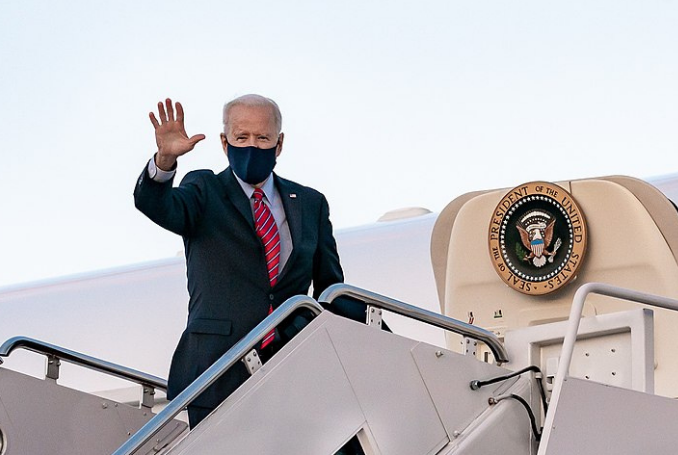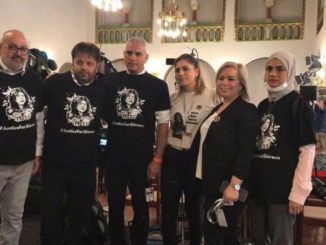
By Benay Blend
As Valentine’s Day approaches, it’s good to remember that abusive relationships never end the way we want. When the other partner tells you who she/he really is, it’s always good to listen. During remarks at the 67th Israeli Independence Day Celebration, then Vice President Biden declared his love for Israel.
Despite previously held anti-colonial positions—for Palestine, for Indigenous people in the US on the frontlines fighting for the environment, for Black Lives Matter—that support goes away among various segments of the American left during election years, which in the US are biennial events.
“If leftists choose to participate,” Steven Salaita writes, “they should do it without making certain people disposable.” The rationale for this behavior goes as follows:
- “Yes, Israel’s treatment of Palestinians is terrible, but if you chose to let that influence your vote (or non-vote) then you are nothing but a ‘purist’ who is responsible for Trump’s comeback in 2024.”
- “If you let the Republicans win the House and Senate in 2022, you will have much less influence in government.”
- “Sure, Biden is a centrist, but after the election, we can push him to the left,” a “whimsical belie[f]” at best, write Salifu Mack and Erica Caines, that has yet to emerge in any of his domestic or international policies.
As Joe Biden moves farther and farther to the right, some of us are still waiting on that last one.
Indeed, Salaita claims, this line of thinking, that expects the oppressed to teach the oppressor about their oppression, not only falsely assumes that the targeted officials will listen, but also “shifts the onus of moral negligence from elites articulating a fundamentally violent position onto the recipients of that violence.”
For the most part, any name can be substituted for Biden, with the caveat that the relationship with Israel is closer/less close than the President.
As Ramzy Baroud observes, Biden’s policy regarding Palestine appears to be little more than a “soft façade” for the same initiatives proposed by Donald Trump.
While voters ponder which corporate-beholden candidate will bring us national health care, there are people in this country, and around the world—those who are literally on the frontlines—left out of these conversations. To include them would expose some hard truths about those still promoting the Democratic Party in the hopes that someday there might be change.
“There is no harm reduction in a system dedicated to neo-liberalism and austerity,” Margaret Kimberly correctly notes. Moreover, when anti-imperialism got swept away by the overriding goal of defeating Trump, colonized people at home and around the world lost importance. Some have barely time to catch their breath before mid-term elections roll around awash with the same shenanigans.
What might prompt liberals to change pardners in this dance? Those who thought that Biden would do better with the pandemic are finding that this relationship is not much better than the last. Writing for Teen Vogue, Abdullah Shihipar suggests that framing the strategy for eradicating the virus as individual responsibility—wear a mask, get vaccinated, socially distance—has led to our current problems.
Instead of blaming individuals, Shihipar proposes all of the tactics that a socialist, centralized strategy might provide: accessible tests that people can use daily; safe workplace and school environments; guaranteed housing, government-sponsored stimulus checks and hazard pay when businesses are forced to close.
“So get mad, yes,” he concludes, “but direct most of your anger above, not below.”
Similarly, I would submit that liberals might direct their anger at the Democratic Party’s stubborn adherence to outworn tactics rather than at disenchanted voters who can no longer support their incompetence. Those who understand colonialism first hand—Palestinians, Indigenous populations, African Americans—find themselves at odds with much of the social justice movement during and after biennial elections.
This is especially true right now when the Democratic Party seems to be leading us into a war with Russia over the sovereignty of Ukraine. “Over the last few weeks,” explains civil rights and environmental activist Ajamu Baraka, “the propagandists have been busy inundating the public with stories of Russia aggression in Ukraine.”
For example, the New York Times recently reported that the Kremlin was mulling plans to install a pro-Russian government in Ukraine, while simultaneously President Vladimir Putin is weighing his options regarding the invasion. In response, Democracy Now recounts that the US has put 8500 troops on high alert between the two nations.
What the press leaves out, Baraka claims, is that the Obama/Biden administration supported a coup against a democratically elected government in Ukraine, a take-over that, moreover, resulted in a significant number of neo-Nazis in its ranks. That was only one of several coups that the US instigated during those years.
Moreover, he continues, we are asked to gloss over this information in order to support the latest “Imperialist intrigue.” To be fair, self-identified radicals and leftists might claim to be anti-war, but when they continue to support the Democratic Party which has no qualms about furthering its imperialist agenda, they are nevertheless complicit in the outcome.
Why is this important, and what does it have to do with Palestine? As Baraka makes clear, not having an understanding of imperialism—whether it’s sending military aid to Israel or Ukraine—ensures that “the colonized, the working classes, the oppressed, and all of global humanity”—will continue to suffer and die.
If Palestinians are considered throw-away people during election years, so are Ukrainians, Africans, and the marginalized in our own country, so it is imperative to see the connections as worldwide. Our attention must extend beyond our borders no matter what the price, because, concludes Baraka:
“The right to peace is fundamentally intertwined with the right to life, and both rights are ‘People(s)-centered human rights.’ However, these fundamental rights will never be realized as long as we allow the capitalist criminals currently in control of the US state and system to operate with impunity. The task is clear.”

– Benay Blend earned her doctorate in American Studies from the University of New Mexico. Her scholarly works include Douglas Vakoch and Sam Mickey, Eds. (2017), “’Neither Homeland Nor Exile are Words’: ‘Situated Knowledge’ in the Works of Palestinian and Native American Writers”. She contributed this article to The Palestine Chronicle.







